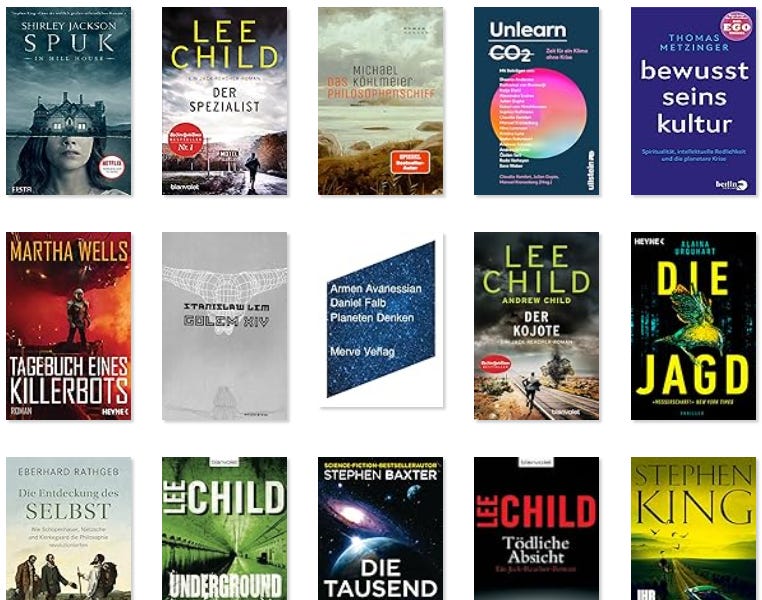Booksbooksbooks 12/24

Recent Reads
Stephen King's "You Like It Darker"
A must-have for Stephen King fans, this collection features brilliant stories like "Danny Coughlin's Bad Dream," a gripping tale of guilt and justice with an unforgettable antagonist.
Adrian Tchaikovsky's "Children of Time #3"
Tchaikovsky's sprawling space opera continues with "The Enemies of Time," a riveting blend of fantasy and science fiction that introduces crows into the mix, creating a captivating tale in a hostile world far from Earth.
Stephen Baxter's "The Thousand Earths"
Baxter delivers escapist sci-fi with "The Thousand Earths," featuring futuristic imagery and well-worn characters. While it may not be his best work, it offers a quick escape into the vastness of space.
Eberhard Rathgeb's "Discovery of the Self"
Rathgeb delves into the impact of philosophers Schopenhauer, Nietzsche, and Kierkegaard on individualism during the Romantic era. An engaging read that explores the existential struggles of these thinkers, albeit with some unnecessary art history excursions.
Alaina Urquhart's "The Butcher and the Wren"
A true crime podcast host's debut novel disappoints with its lack of originality and stereotypical characters. Urquhart's background in investigative journalism does not save this formulaic thriller.
Armen Avanessian and Daniel Falb's "Thinking Planets"
An enlightening introduction to planetarism, this book explores the impacts of Earth systems on human psychology and sociology. With a clear and even humorous writing style, it highlights the importance of understanding timeframes beyond individual experiences.
Stanisław Lem's "Golem XIV"
A fascinating novella where an AI delivers philosophical lectures to humanity, showcasing the author's imagination and satirical wit. While slightly dated, "Golem XIV" remains a thought-provoking read.
Michael Tomasello's "The Evolution of Agency"
Tomasello presents his groundbreaking theory on the evolution of psychological agency, comparing species from lizards to humans. His insights illuminate the development of feedback control systems and consciousness.
Lee Child's Reacher Series
Reacher is a reliable source of entertaining action adventures, albeit with some predictable elements in the later books co-written with Andrew Child. Still, the overall series provides a satisfying escape into the world of a relentless private investigator.
Alexandre Dumas' "The Count of Monte Cristo"
A classic adventure with unforgettable characters, but beware of the lengthy dialogues and aristocratic language that may test your patience. Nonetheless, the grand scale and imaginative scenes make it a worthwhile read.
Martha Wells' "The Murderbot Diaries #1-4"
These novellas, collected as a novel, offer a unique perspective with their sardonic protagonist. While repetitive at times, they become more engaging towards the end, showcasing a lively and introspective read.
Thomas Metzinger's "Culture of Awareness"
Metzinger argues for a "panic-point" in the climate crisis and proposes developing meditative skills to prepare for the unknown. While his view on secular spirituality is intriguing, it remains to be seen if it can effectively address the material challenges ahead.
Claudia Kemfert, Julien Gupta, and Manuel Kronenberg's "Unlearn CO2"
An overview of climate change and activism, this book provides insights into various sectors contributing to carbon emissions. It could have benefited from more scientific depth, but its scope remains important.
Michael Köhlmeier's "The Ship of Philosophers"
A beautiful novella that reflects on truth and historical narratives through the lens of Soviet deportations. Köhlmeier's wit and the narrator's unique perspective create a captivating and thought-provoking read.
Shirley Jackson's "The Haunting of Hill House"
A masterpiece of horror, Jackson's novel captivates with its elaborate style and spiraling madness. The haunting atmosphere and unsettling repetition will send shivers down your spine, culminating in a chilling conclusion.
Dan Jones' "Powers and Thrones"
A comprehensive history of the Middle Ages, Jones' work presents a sweeping panorama of events spanning from Byzantium to the Reformation. With its rich and detailed narrative, "Powers and Thrones" ranks alongside classic histories.
Guido Tonelli's "Matter: The Magnificent Illusion"
Tonelli's literary flair shines as he recounts the history of matter, from ancient Greeks to quantum physics. His poetic prose illuminates the uncertain reality of the quantum realm, making this a particularly insightful and enjoyable read.
Carolin Amwinger and Oliver Nachtwey's "Freedom Insulted"
A brilliant analysis of contemporary political developments, Amwinger and Nachtwey argue that freedom has become a commodified good, leading to growing insults to individual liberties. Their lucid indictment of neoliberalism and its societal consequences is essential reading for understanding the rise of populism and conspiracy beliefs.
Tom Rob Smith's "Cold People"
A disappointing science fiction thriller that fails to engage with its convoluted exposition, clichéd tropes, and uninspired characters. Despite the promising premise, this novel remains a waste of time.